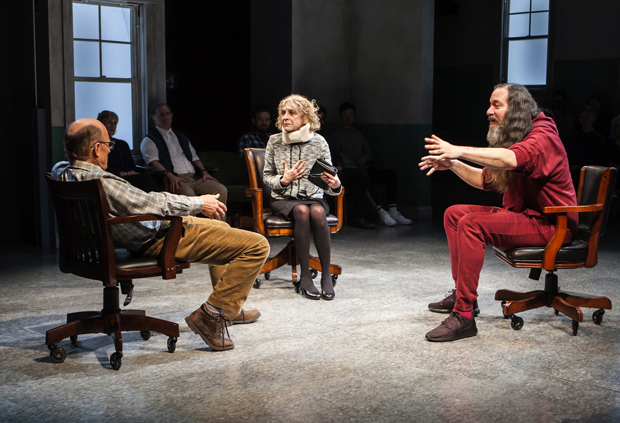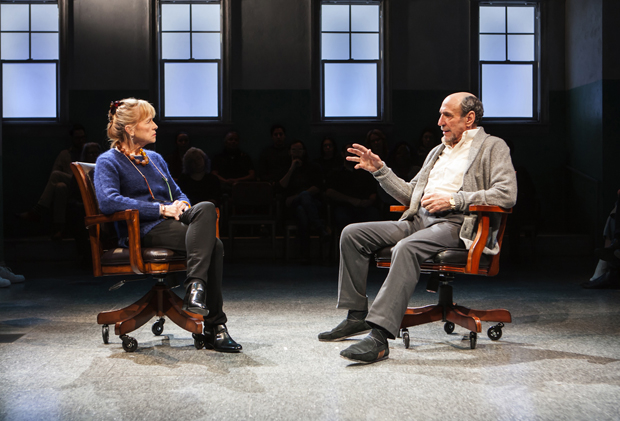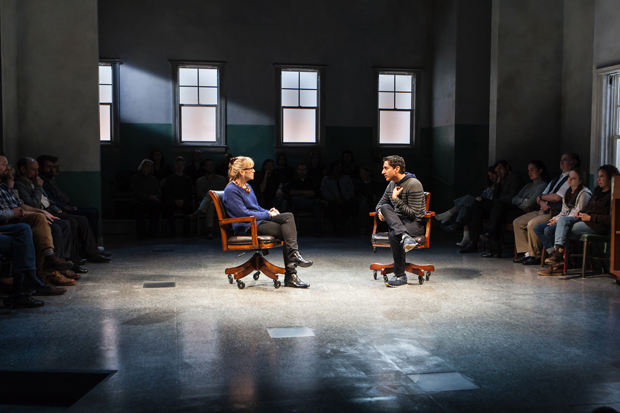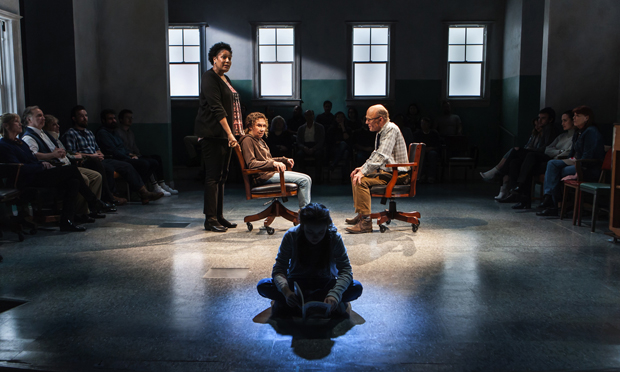America's Mental Health on the Brink in Good for Otto

(© Monique Carboni)
While there are no reliable statistics, psychotherapists falling asleep during sessions happens frequently enough to merit articles in several prominent publications. If the professionals are doing it to their real clients, you don't have to feel bad about doing it to the fictional patients of the Northwood Mental Health Center. That's the setting of David Rabe's snooze of a play, Good for Otto, which is now making its New York debut in a production by the New Group at Signature Center.
Rabe is the 1972 Tony Award-winning playwright of Sticks and Bones, which bravely took on the subject of returning Vietnam veterans when the war was still ongoing. That play received an excellent revival from the New Group and director Scott Elliott in 2014, and Elliott helms again here. Regrettably, not even an all-star cast can enliven this meandering stroll past a vitally important topic.

(© Monique Carboni)
That would be the crumbling state of America's mental health infrastructure, which has been the subject of much debate recently, mostly as a way to deflect attention from our serious gun problem. Still, it's difficult to deny that mental healthcare is lacking in a country as rich as this one. Northwood's lead counselor and administrator, Doctor Michaels (a harried Ed Harris), seems particularly exhausted by the crush of patients and paperwork. His fellow therapist, Evangeline Ryder (a poker-faced Amy Madigan), and receptionist Denise (Lily Gladstone) try to ease the burden as much as they can, but some of their clients need a lot more help than they or their insurance plans can provide.
Individually compelling storylines emerge from the play, buoyed mostly by the acting. Rileigh McDonald gives a frightening performance as Frannie, a disturbed preteen with a history of abuse. Mark Linn-Baker convincingly portrays a man with a social disorder who frequently gets into fights with strangers. F. Murray Abraham is grandfatherly in the best way as depressed retiree Barnard. We enjoy listening to him speak, even if we don't particularly care about the trip to the supermarket he mellifluously describes.
During one scene, a manic gay man named Alex (an unpredictable Maulik Pancholy) asks Evangeline if she is gay. "We don't talk about ourselves, Alex," she answers professionally, if coldly. Unfortunately, the format of therapy doesn't easily lend itself to drama, which is most powerful when its characters are in dialogue. It is difficult to get that jolt of dramatic electricity when one character pours his heart out and the response from his scene partner is a silently scribbled note.

(© Monique Carboni)
Rabe gives us tastes of the angry young playwright from Sticks and Bones when Dr. Michaels gets on the phone with insurance representative Marcy (Nancy Giles, exhibiting the polite aggression of a living, breathing chatbot). Suddenly, we feel our pulses rise as we contemplate a health system in which our care is not rationed by a government in which we have a vote, but a private organization beholden only to its shareholders. Frustratingly, that direction is quickly abandoned for the tedium of someone else's therapy session.
The script's dullness is reflected in the walls of Derek McLane's beige and hospital green set. Composer Kenny Mellman (who also plays a hoarder named Jerome) sits behind an upright piano stage left and plunks out Mister-Rogers-feeding-the-fish music, which further lulls us into a tranquil haze. Jeff Mashie's contemporary casual costumes are adequate, while Jeff Croiter's deliberate lighting brings some order to a digressive plot. Elliott creates every scene with just a few swivel chairs, but this is not as impressive as it sounds considering that we're mostly just looking at a therapist's office.

(© Monique Carboni)
As I watched these one-way conversations, it struck me that in this capitalist country, we’ve even managed to commodify compassion: For a fee, a professional will listen to your woes and help you work through them, but only in one-hour increments. Rabe leads us to question whether every human interaction ought to be traded as a service.
If you're wondering about the title, know that there are 15 characters in this play and none of them are named Otto. I won’t spoil who is, which you will learn if you stick around for hour three of Good for Otto. If you decide that your time could be better spent checking in on the people you love, good for you.










